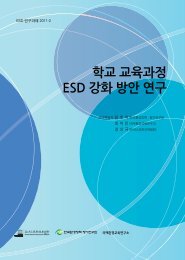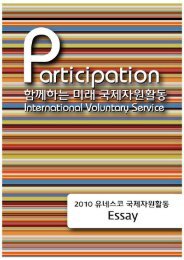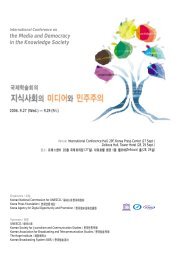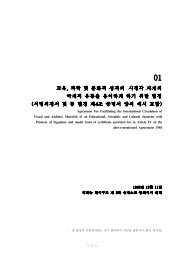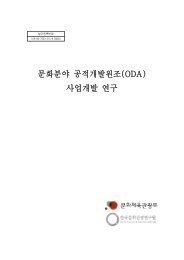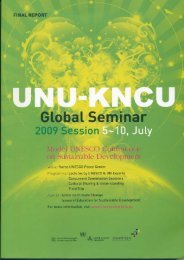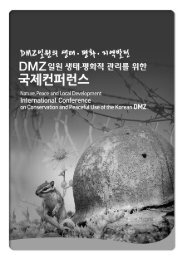íëìë³´ë2012문íì ë°ì ë¼ì´ëí ì´ë¸.pdf - ì ë¤ì¤ì½íêµììí
íëìë³´ë2012문íì ë°ì ë¼ì´ëí ì´ë¸.pdf - ì ë¤ì¤ì½íêµììí
íëìë³´ë2012문íì ë°ì ë¼ì´ëí ì´ë¸.pdf - ì ë¤ì¤ì½íêµììí
You also want an ePaper? Increase the reach of your titles
YUMPU automatically turns print PDFs into web optimized ePapers that Google loves.
toward cultural strategies. That is, default options or cultural strategies that can trigger<br />
intrinsic motives the way economics or political factors can are required. The chances of<br />
getting the poor out of the poverty trap can be increased by intervening in their way of<br />
thinking and providing them with economic assistance at the same time. According to<br />
Mullainathan (2010), policies that do not analyze behaviors of the poor cannot become antipoverty<br />
strategies. In fact, an experiment conducted on students of low-income households<br />
found that simple economic solutions such as scholarships were ineffective in increasing<br />
class attendance rates. The process of applying for scholarship required more attention than<br />
was possessed by students, and was thus not embraced by them. In contrast, attendance rates<br />
substantially rose when schools actively took part in the administrative procedures. As shown<br />
in the experiment, culture-based simplification strategies are needed when individual<br />
attention has been depleted.<br />
In addition, mobile or online networks can be presented as specific strategies. According to<br />
a 2011 survey by the International Telecommunication Union (ITU), as many as 6 billion<br />
people are currently in use of mobile services. Of these people, 79% live in developing<br />
countries where mobile usage rates exceed access rates to electricity or drinking water. It was<br />
also found that an increase of 10% in mobile penetration was followed by an annual GDP<br />
increase of 0.8%. As is evident by such statistics, mobile services are closely linked to the<br />
everyday lives people in developing countries. Related services are thus expected to<br />
contribute to the improvement of living standards. The use of culture can be further<br />
diversified through such services, with one possibility being alleviating poverty via culture<br />
and art. For example, a business model that allows the poor to learn photography (or other<br />
such arts that require little prior training or background knowledge) via mobile applications<br />
can be developed into a social enterprise.<br />
Samuel Huntington, well-known for his theory regarding the Clash of Civilizations (2001),<br />
emphasized the prosperous life that can be brought by culture in “Culture Matters.” When a<br />
country moves from one developmental stage to the next, its economy typically faces a crisis<br />
that is characterized by an occurrence of temptation. Whether the country can resist it<br />
determines whether economic development takes place or not. The key to resistance is culture.<br />
Culture has the power to stop a country from succumbing to temptation. It is through culture<br />
that countries can prosper. This notion can be applied to individuals as well. Individuals face<br />
countless temptations in the course of growth and maturity. The ease with which they resist<br />
temptation determines the time taken to achieve growth or success. The time is ripe for



